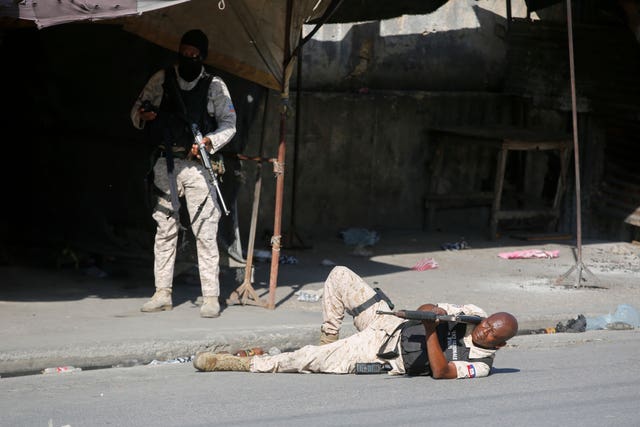
Simon Marks 3pm - 7pm
2 March 2024, 08:44

Officers were overwhelmed by co-ordinated attacks across the capital.
Haitian police were overwhelmed by a series of co-ordinated violent attacks by gang members across the capital in which four officers were killed, a spokesman for the national force has said.
The attacks on Thursday in Port-au-Prince were led by gunmen who opened fire on targets including Haiti’s international airport and seized control of two police stations, prompting people to flee communities in fear as schools and businesses closed.
Spokesman Garry Desrosiers said in an interview with Radio Caraibes: “The situation yesterday was horrible. The city centre was at war.”
Jimmy Cherizier, a former elite police officer known as Barbecue who now runs a gang federation known as G9 and Family and Allies, claimed responsibility for the attacks.

He said the objective was to capture Haiti’s police chief and government ministers and prevent the return of Prime Minister Ariel Henry, who was in Kenya to push for the UN-backed deployment of police from the East African nation to fight gangs in Haiti.
Neither the police chief nor government ministers were injured or captured during Thursday’s attacks.
As of late Friday morning, most of Port-au-Prince remained peaceful as people resumed their routines.
The main international airport reopened, but by Friday afternoon, the US embassy reported heavy gunfire near the airport and said it was temporarily halting all official travel to the facility.
Meanwhile, the capital’s centre was largely deserted as most schools and businesses remained closed.
Mr Desrosiers said the young officers stood up and fought “to guarantee the security of the population”, adding that authorities could not reach the station in time to repel the attack.
He said police faced a lack of logistics and equipment to properly fight the gangs on Thursday, as well as roadblocks that remained in place on Friday in dozens of communities preventing officers from responding to attacks.
From today's briefing on Haiti: pic.twitter.com/inQBhNxZ3w
— UN Spokesperson (@UN_Spokesperson) March 1, 2024
“Despite everything we had to deal with, the will was there,” Mr Desrosiers said.
Haiti’s National Police has roughly 9,000 officers on duty at a time for a country of more than 11 million people, according to the UN. The officers are routinely overwhelmed and outgunned by powerful gangs estimated to control up to 80% of Port-au-Prince.
“The police are in need of more equipment to be able to face the situation,” Mr Desrosiers said.
Mr Henry, the prime minister, has not publicly commented on the situation and simply shrugged when asked if he felt it was safe to return to Haiti from Kenya.
He signed reciprocal agreements on Friday with Kenyan President William Ruto to try and salvage the plan to deploy Kenyan police to Haiti.
Kenya’s high court in January ruled that the deployment was unconstitutional, in part because the original deal lacked reciprocal agreements between the two countries.
UN spokesman Stephane Dujarric said the latest upsurge in violence and deteriorating situation in Haiti underline why the United Nations wants member nations to work quickly to support and deploy the multi-national security force.
“We have been talking for months now about how civilians in Haiti and in Port-au-Prince are basically trapped by gang violence,” he told reporters at the UN headquarters in New York.
“Schools are closed, hospitals are not functioning, people are suffering on a daily basis.”
Mr Dujarric said the mission urgently needs more support, both financially and for its security component.